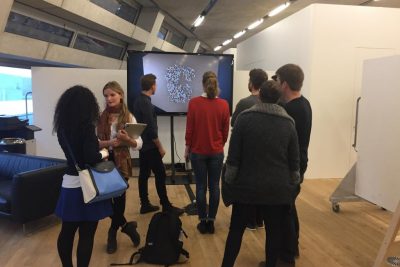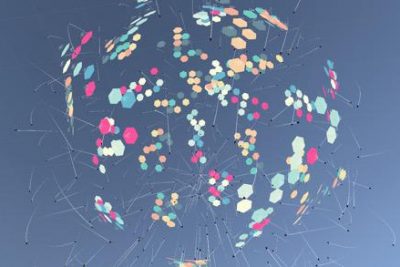This workshop was organised in relation to the installation ‘How do we know who we are?’, a collaboration between Dawid Górny, a programmer and interaction designer, and Evelyn Ruppert, Principle Investigator of a European Research Council funded project, ARITHMUS , Goldsmiths, University of London (Peopling Europe: How data make a people: http://arithmus.eu/).
The ARITHMUS project organised this workshop to address the question of how ‘Europe’ has been unable to address itself politically to a constituted polity and people that are something more than an agglomeration of nation-states. From the resurgence of nationalisms to the crisis of the single currency and the unprecedented decision of a member state to leave the European Union, core questions about the future of ‘Europe’ have been rearticulated: Who are the people of ‘Europe’? Is there a ‘European’ identity? What does it mean to say ‘I am European’? Where does ‘Europe’ begin and end, and who can legitimately claim to be a part of a ‘European’ people? If ‘Europe’ is to be more than a geographical marker how might it be conceived as a polity?
For the workshop, we discussed various data practices through which the people of ‘Europe’ are enumerated, classified, narrated, delimited, quantified, talked about, territorialised, visualized and imagined into being as knowable, identifiable and actionable entities and groups of people, such as citizens, migrants, travellers, minorities, tax payers, vulnerable people, criminals and so on. The six researchers who make up ARITHMUS along with 12 invited researchers from several European countries engaged with these issues and in relation to the overall Tate Exchange ‘Who Are We?’ programme and with the ‘How do we know who we are?’ installation more specifically.
Participants
ARITHMUS, Goldsmiths, University of London: Baki Cakici, Francisca Grommé, Evelyn Ruppert, Stephan Scheel, Ville Takala and Funda Ustek-Spilda.
Invited participants:
Michael Hockenhull, IT University of Copenhagen (DK); Annalisa Pelizza, University of Twente (NL); Helen Ratner, Copenhagen Business School, Copenhagen (DK); Rogier van Reekum,Erasmus University Rotterdam (NL); Silvan Pollozek, Technical University of Munich (DE); Jan-Hendrick Passoth, Technical University of Munich (DE); Amade M’charek, University of Amsterdam (NL); Ildikó Plájás, University of Amsterdam (NL); Susanne Schultz, Goethe University Frankfurt/M (DE); Sanne Boersma, Erasmus University Rotterdam (NL); Gabriel G. Blouin, Virginia Tech (US); Marisa Cohn, IT University of Copenhagen (DK).


